

The Concord School of Philosophy was a lyceum-like series of summer lectures and discussions of philosophy in Concord, Massachusetts, from 1879 to 1888.


The Concord School of Philosophy was a lyceum-like series of summer lectures and discussions of philosophy in Concord, Massachusetts, from 1879 to 1888.
Starting the Concord School of Philosophy had long been a goal of founder Amos Bronson Alcott and others in the Transcendental movement. [1] He and Franklin Benjamin Sanborn composed a prospectus for the school on January 19, 1879, which was sent to potentially interested people throughout the country. [2]
The school opened in the summer of 1879; its first meeting was held in the study of the Alcott family home, Orchard House. [1] A new home for the School was built for use the next summer with the financial support of William Torrey Harris and of his daughter Louisa May Alcott. Sanborn was the school's secretary.
The school was based partly on Plato's Academy. [1] Many of the school's lectures and readings focused on reminiscences of the Transcendentalists: Ralph Waldo Emerson attended some of the school's meetings before his death, and was commemorated after; readings from Henry David Thoreau's then-unpublished journals were among the most popular events. In addition, there were many lectures on other philosophical topics — principally the neo-Platonism favored by Alcott and the Hegelianism favored by Harris, but series of lectures were also given on Kant and Fichte, among others. The final meeting commemorated Alcott, who had died in 1888.
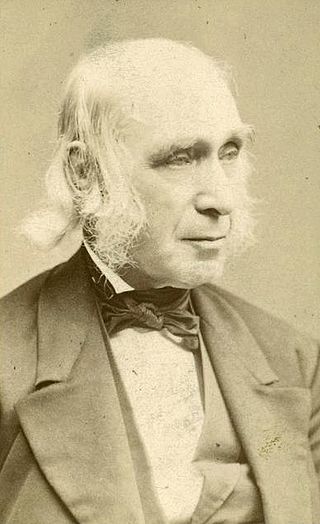
Amos Bronson Alcott was an American teacher, writer, philosopher, and reformer. As an educator, Alcott pioneered new ways of interacting with young students, focusing on a conversational style, and avoided traditional punishment. He hoped to perfect the human spirit and, to that end, advocated a plant-based diet. He was also an abolitionist and an advocate for women's rights.

Louisa May Alcott was an American novelist, short story writer, and poet best known for writing the novel Little Women (1868) and its sequels Little Men (1871) and Jo's Boys (1886). Raised in New England by her transcendentalist parents, Abigail May and Amos Bronson Alcott, she grew up among many well-known intellectuals of the day, including Margaret Fuller, Ralph Waldo Emerson, Nathaniel Hawthorne, Henry David Thoreau, and Henry Wadsworth Longfellow.

Concord is a town in Middlesex County, Massachusetts, in the United States. In the 2020 census, the town population was 18,491. The United States Census Bureau considers Concord part of Greater Boston. The town center is near where the confluence of the Sudbury and Assabet rivers forms the Concord River.
Transcendentalism is a philosophical, spiritual, and literary movement that developed in the late 1820s and 1830s in the New England region of the United States. A core belief is in the inherent goodness of people and nature, and while society and its institutions have corrupted the purity of the individual, people are at their best when truly "self-reliant" and independent. Transcendentalists saw divine experience inherent in the everyday, rather than believing in a distant heaven. Transcendentalists saw physical and spiritual phenomena as part of dynamic processes rather than discrete entities.

Abigail May Alcott Nieriker was an American artist and the youngest sister of Louisa May Alcott. She was the basis for the character Amy in her sister's semi-autobiographical novel Little Women (1868). She was named after her mother, Abigail May, and first called Abba, then Abby, and finally May, which she asked to be called in November 1863 when in her twenties.

Sleepy Hollow Cemetery is a rural cemetery located on Bedford Street near the center of Concord, Massachusetts. The cemetery is the burial site of a number of famous Concordians, including some of the United States' greatest authors and thinkers, especially on a hill known as "Authors' Ridge."
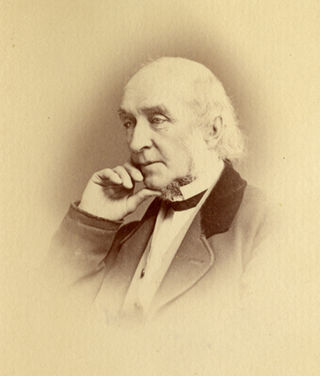
William Ellery Channing II was an American Transcendentalist poet, nephew and namesake of the Unitarian preacher Dr. William Ellery Channing. His uncle was usually known as "Dr. Channing", while the nephew was commonly called "Ellery Channing", in print. The younger Ellery Channing was thought brilliant but undisciplined by many of his contemporaries. Amos Bronson Alcott famously said of him in 1871, "Whim, thy name is Channing." Nevertheless, the Transcendentalists thought his poetry among the best of their group's literary products.

Little Men, or Life at Plumfield with Jo's Boys, is a children's novel by American author Louisa May Alcott (1832–1888), which was first published in 1871 by Roberts Brothers. The book reprises characters from her 1868–69 two-volume novel Little Women, and acts as a sequel, or as the second book in an unofficial Little Women trilogy. The trilogy ends with Alcott's 1886 novel Jo's Boys, and How They Turned Out: A Sequel to Little Men. Alcott's story recounts the life of Jo Bhaer, her husband, and the various children at Plumfield Estate School. Alcott's classic novel has been adapted to a 1934 film, a 1940 film, a 1998 film, a television series, and a Japanese animated television series.

The Wayside is a historic house in Concord, Massachusetts. The earliest part of the home may date to 1717. Later it successively became the home of the young Louisa May Alcott and her family, who named it Hillside, author Nathaniel Hawthorne and his family, and children's writer Margaret Sidney. It became the first site with literary associations acquired by the National Park Service and is now open to the public as part of Minute Man National Historical Park.
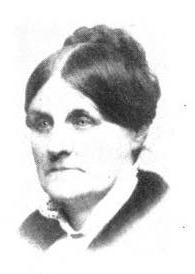
Abigail "Abba" Alcott was an American activist for several causes and one of the first paid social workers in the state of Massachusetts. She was the wife of transcendentalist Amos Bronson Alcott and mother of four daughters, including Civil War novelist Louisa May Alcott.
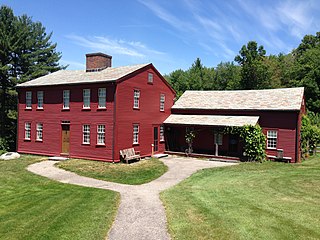
Fruitlands was a utopian agrarian commune established in Harvard, Massachusetts, by Amos Bronson Alcott and Charles Lane in the 1840s, based on transcendentalist principles. An account of its less-than-successful activities can be found in Transcendental Wild Oats by Alcott's daughter Louisa May Alcott.

Orchard House is a historic house museum in Concord, Massachusetts, United States, opened to the public on May 27, 1912. It was the longtime home of Amos Bronson Alcott (1799–1888) and his family, including his daughter Louisa May Alcott (1832–1888), who wrote and set her novel Little Women (1868–69) there.
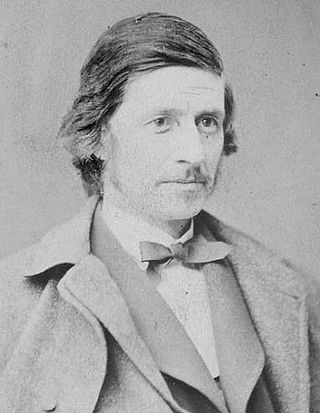
Franklin Benjamin Sanborn was an American journalist, teacher, author, reformer, and abolitionist. Sanborn was a social scientist, and a memorialist of American transcendentalism who wrote early biographies of many of the movement's key figures. He founded the American Social Science Association, in 1865, "to treat wisely the great social problems of the day". He was a member of the so-called Secret Six, or "Committee of Six", which funded or helped obtain funding for John Brown's Raid on Harpers Ferry; in fact he introduced Brown to the others.

Ednah Dow Littlehale Cheney was an American writer, reformer, and philanthropist.
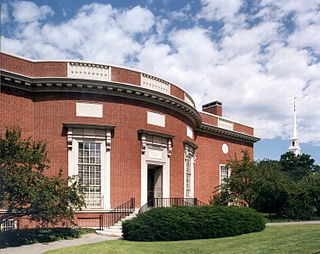
Houghton Library, on the south side of Harvard Yard adjacent to Widener Library, Lamont Library, and Loeb House, is Harvard University's primary repository for rare books and manuscripts. It is part of the Harvard College Library, the library system of Harvard's Faculty of Arts and Sciences. The collections of Houghton Library include the Harvard Theatre Collection and the Woodberry Poetry Room.
Anna Bronson Alcott Pratt was the elder sister of American novelist Louisa May Alcott. She was the basis for the character Margaret "Meg" of Little Women (1868), her sister's classic, semi-autobiographical novel.
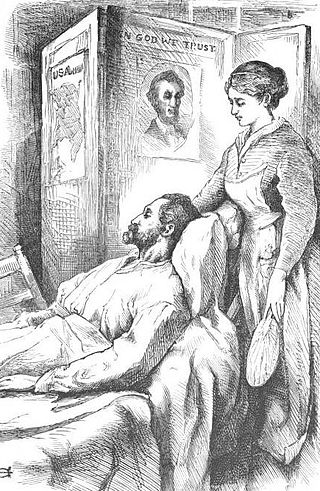
Hospital Sketches (1863) is a compilation of four sketches based on letters Louisa May Alcott sent home during the six weeks she spent as a volunteer nurse for the Union Army during the American Civil War in Georgetown.
Ellen M. Mitchell (1838–1920) was an American philosopher, educator and education reformer. She was one of the first women to be appointed lecturer in a university, in addition to writing philosophy, literature and literary criticism.
Minot Pratt was a founder, a director and head farmer of the Brook Farm experimental community, a printer, a friend of noted Concord, Massachusetts, writers, Henry David Thoreau, Amos Bronson Alcott, Louisa May Alcott, Ralph Waldo Emerson, and Nathaniel Hawthorne, and a naturalist in Concord, Massachusetts. At his death in 1878 it was written of him: “his recreation, and one might say, his worship, was among the wild-flowers and woodlands, which he knew almost as familiarly as Thoreau did. Thoreau was a ‘poet-naturalist,’ Minot Pratt was a farmer-naturalist, -- but in both the love of nature was far stronger than the mere scientific thirst for knowledge. They revered nature and treated her with the modesty due to a maiden, and with the respect of a young lover. This sentiment did not wither as age came on.”
The Concord Female Anti-Slavery Society was a female abolitionist organisation in Concord, Massachusetts, in the mid 19th century. This society was a significant influence on Henry David Thoreau, Ralph Waldo Emerson, and Louisa May Alcott.